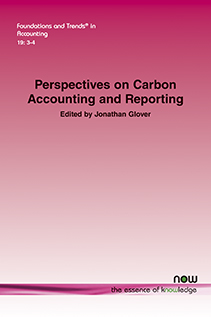Corporate Carbon Accounting: Current Practices and Opportunities for Research
By Gunther Glenk, Business School, University of Mannheim, Germany, glenk@uni-mannheim.de
Abstract
This work reviews current practices in corporate carbon accounting and highlights opportunities for future research. The common framework for determining and reporting corporate greenhouse gas (GHG) emissions today is the GHG Protocol. Like financial accounting standards, this framework includes overarching objectives, principles for conceptual guidance, and procedures for determining key outcome variables. Their design and implementation, however, often result in disclosures that obscure firms’ actual emissions and decarbonization progress. Recognizing the growing demand for transparency, standard-setters worldwide have recently introduced regulations for carbon accounting and reporting. These regulations require companies to disclose decision-useful information on their emissions. Yet, they have also largely adopted the GHG Protocol for how companies should determine and report their emissions. Accounting scholars now have the opportunity to develop solutions that will make corporate carbon accounting an effective tool in combating climate change.
Perspectives on Carbon Accounting and Reporting
Double-entry bookkeeping revolutionized financial accountability centuries ago, and today, its principles are shaping a new frontier—carbon accounting. The articles in this issue on Perspectives on Carbon Accounting and Reporting were contributed by leading academic and practitioner experts on carbon accounting. The authors highlight key challenges, including responsibility for Scope 3 emissions, reliance on third-party estimates, the allocation of emissions to products, the importance of integrating carbon accounting with traditional financial and managerial accounting systems, and the need for commonly accepted carbon accounting standards.

Companion
Foundations and Trends® in Accounting, Volume 19, Issue 3-4 Special Issue: Perspectives on Carbon Accounting and Reporting
See the other articles that are also part of this special issue.